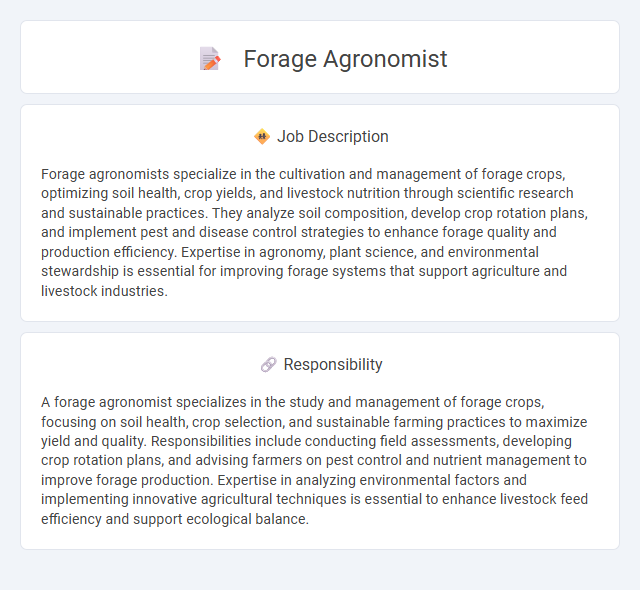
Forage agronomists specialize in the cultivation and management of forage crops, optimizing soil health, crop yields, and livestock nutrition through scientific research and sustainable practices. They analyze soil composition, develop crop rotation plans, and implement pest and disease control strategies to enhance forage quality and production efficiency. Expertise in agronomy, plant science, and environmental stewardship is essential for improving forage systems that support agriculture and livestock industries.
Individuals with a strong interest in agriculture, plant science, and sustainable farming practices may likely be well-suited for a forage agronomist role, as the job involves analyzing soil and crop conditions to optimize forage production. Those who enjoy working outdoors and have good problem-solving skills could probably adapt to the physical and technical demands of the position. Conversely, people lacking patience for detailed scientific research or disinterest in environmental factors influencing crop growth might find this career less compatible with their strengths and preferences.
Qualification
Forage agronomists typically require a bachelor's degree in agronomy, soil science, or a related field, with many roles preferring a master's degree for advanced research positions. Key qualifications include a strong understanding of plant biology, soil management, and forage crop production, along with skills in data analysis and field research techniques. Professional certifications such as Certified Crop Adviser (CCA) can enhance job prospects and demonstrate expertise in forage and crop management.
Responsibility
A forage agronomist specializes in the study and management of forage crops, focusing on soil health, crop selection, and sustainable farming practices to maximize yield and quality. Responsibilities include conducting field assessments, developing crop rotation plans, and advising farmers on pest control and nutrient management to improve forage production. Expertise in analyzing environmental factors and implementing innovative agricultural techniques is essential to enhance livestock feed efficiency and support ecological balance.
Benefit
Working as a forage agronomist likely offers the benefit of contributing to sustainable agriculture by improving crop yields and soil health. This role probably involves applying specialized knowledge to optimize forage production, which can enhance livestock nutrition and farm profitability. Professionals in this field may also experience opportunities for research and innovation, potentially leading to advancements in agricultural practices.
Challenge
Forage agronomist roles likely involve addressing challenges such as optimizing crop yield under variable weather conditions and managing soil health sustainably. They probably need to navigate issues related to pest resistance and the integration of new forage species into existing ecosystems. Balancing economic viability with environmental impact might also present ongoing difficulties in this field.
Career Advancement
A Forage Agronomist specializes in improving pasture and forage crop production through scientific research and field management, leveraging expertise in soil science, plant physiology, and sustainable agriculture. Career advancement in this field often involves progressing from field technician roles to senior research positions, consultancy, or agricultural extension services, with opportunities to influence large-scale farming practices and policy development. Professional growth is further supported by obtaining advanced degrees, certifications, and involvement in industry associations, enhancing expertise and leadership in forage crop management.
 kuljobs.com
kuljobs.com